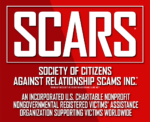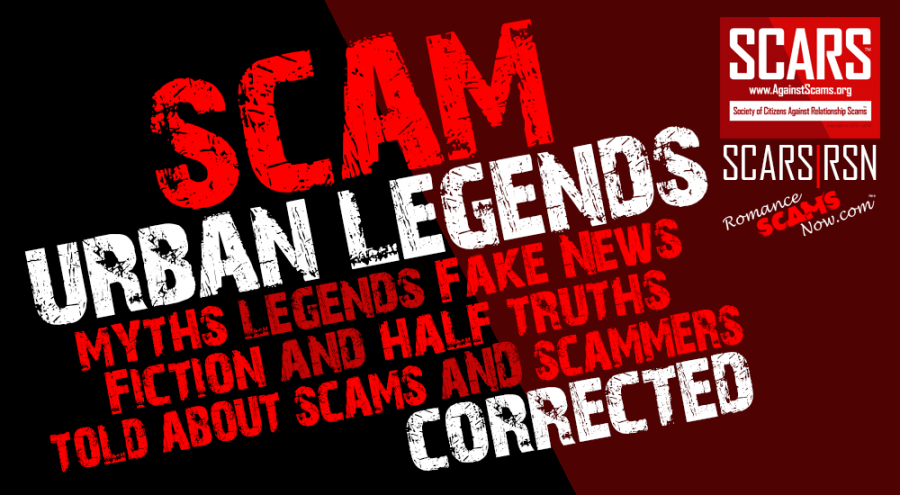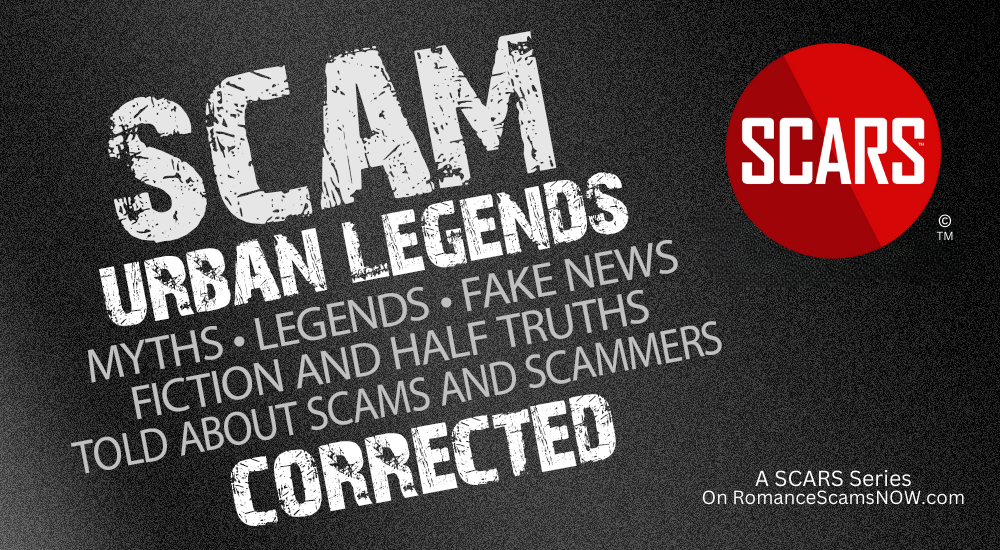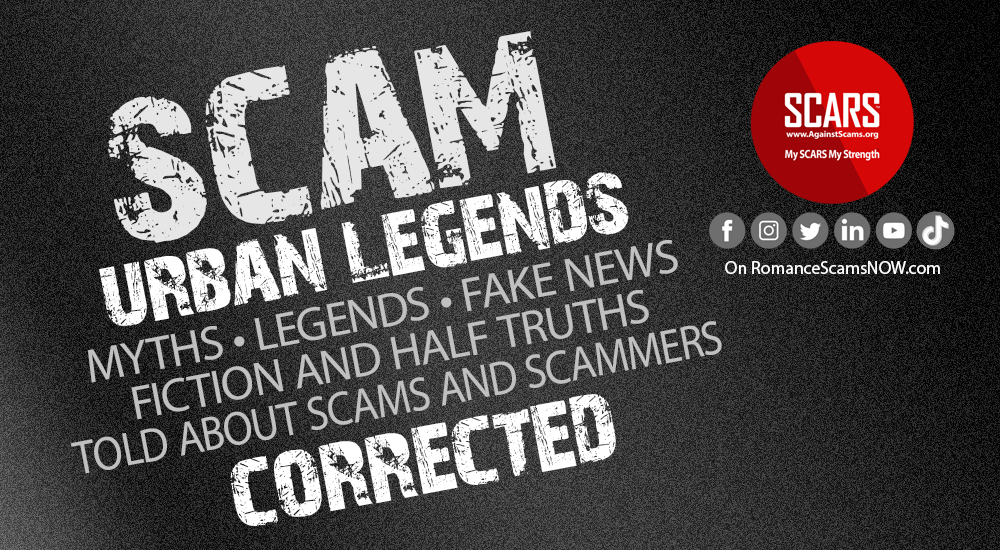
SCARS Institute’s Encyclopedia of Scams™ Published Continuously for 25 Years

SCARS™ Scammer Urban Legends: Chapter 8 – Who Is Responsible?
Who Is Responsible For Scamming?
We constantly hear from victims that say that someone (pick a person) is responsible for global scamming!
Unfortunately, yes, there are many who are responsible and some who are not.
Let’s Look At The Genesis Of Global Online Fraud
It all starts (basically) with the Advance Fee Fraud known as 419 – “419” refers to the section of the Nigerian Criminal Code dealing with fraud, the charges, and penalties for offenders.
An advance-fee scam is a form of fraud and one of the most common types of confidence tricks (“cons”). The scam typically involves promising the victim a significant share of a large sum of money, in return for a small up-front payment, which the fraudster requires in order to obtain the large sum. If a victim makes the payment, the fraudster either invents a series of further fees for the victim or simply disappears. According to the Federal Bureau of Investigation (FBI), “An advance fee scheme occurs when the victim pays money to someone in anticipation of receiving something of greater value—such as a loan, contract, investment, or gift—and then receives little or nothing in return.”
There are many variations of this type of scam, including the typical Nigerian 419 scam, the Spanish Prisoner scam, the black money scam, Fifo’s Fraud and the Detroit-Buffalo scam. The scam started with fax machines and traditional mail and is now all online.
While Nigeria is the #1 source for this and most often the nation referred to in these scams, they have spread around the globe – either by people trained in Nigeria during the oil boom or from Nigerian migrating to other countries and sharing that knowledge.
In 2006, 61% of internet criminals were traced to locations in the United States, while 16% were traced to the United Kingdom, and 6% to locations in Nigeria (according to the FBI) – but the devil is in the details. The FBI views Internet Crime as any act with criminal intent, such as online stalking, cyberbullying, low-grade hacks, and the like. However, Nigerians are the global plague when it comes to online scams, but it is true that it has spread.
Other nations known to have a high incidence of advance-fee fraud include Ivory Coast, Togo (really, all of Western Africa), South Africa, the Netherlands, and Spain. One of the little-known facts of these scams is that Middle Easterners and Turks are also actively involved, and prior to 9/11 Al Qaeda made a significant amount of their money from scams (and they still fund terrorism and human trafficking to this day).
Starting Online
It began with the major online services of the late 1980s.
There were scams on “Bulletin Boards” from 1985. There were scams on Compuserve. There were scams on Prodigy, and PC-Link, and AppleLink (yes by Apple), and on MSN. But they really started to get going on Americal Online. However, let us not forget the Brittish Teletext services that were in widespread use in the UK in the early 1980s as well – where a small number of scams were being tested by fraudsters living in the UK.
By 1991 we started to see the first chat room on AOL talking about Romance Scams (this is where our own Chairman first started to notice them, and address the issue). Scams of various types were swarming through Americal Online in chat rooms, product offerings, messages, and emails. This is where we start to see an expansion and where significant income streams are arriving for individual scammers in Nigeria via Western Union.
Next The Web!
With the emergence of the World Wide Web (a layer sitting on top of the Internet that we still rely on today), we see a huge expansion of email scams as more of the world obtain email addresses. Fortunately, the U.S Government had tight regulation of domain names, so we did not see fake websites until the 2000s. However, email scamming was everywhere. The Nigerian Prince needed everything and had more money than Fort Knox!
Law Of Unforeseen Consequences
In the 1990’s we see a vast expansion in telemarketing moving to call (contact) centers around the world – from India to Latin America to Eastern Europe to (drum roll please!) AFRICA. As telecommunication spread and became dirt-cheap, companies around the world began outsourcing in a big way.
Now think about what outsourced telemarketing really is? It is putting together a physical building with the latest in communication hardware and software to enable rooms full of people to sell, support, and talk to people around the world. Business trained these people to be as close to perfect as they could, training them in the psychology of their buyers. Even teaching them how to overcome their accents and sound like their targets. In most of these countries, telemarketing was a good job, they were mid-level professionals, hiring college graduates. They were smart, efficient, and quick learners. These centers built up extensive training and professional development departments.
Then comes the mid-2000’s when the contact center/telemarketing industry starts to decline. Consumers have had it with weird callers day and night offering things they are not interested in. Consumers stop responding to cold-calls! But vast amounts of money have been invested in these centers, training their people, what will they do?
Many closed their doors and laid off their people. However, most of the centers were locally owned, so they looked for other opportunities. By 2010 about 2/3 of the former contact center business was gone. Those that remained had adapted to other kinds of service outsourcing. Some continued to provide telemarketing since there was still some need for it – especially tech support and customer service, but others looked at different opportunities.
Contact Centers Become Scam Centers
In places like Jamaica, telemarketers turned to Lotto Scamming. India turned to Tech Support and Tax Fraud scamming. Viet Nam, Thailand, Latin America, all have their call centers turned to scamming. We see that in country after country these failing call centers turn to other streams of income. Of course, the United States and Europe are not immune to this either – there are countless centers shut down for running fake programs and offers – it just happens faster and more efficiently. In the rest of the world, as long as they are not scamming locals, their local governments are only too happy to take a small piece of the continuing revenue stream.
Of course, this is not to say that all scamming started this way. There are large numbers of scammer gangs that started sitting on floors or in some obscure cyber cafe. However, it is this conversion from telemarketing to large-scale scamming that is responsible for the huge expansion in scamming from 2008 to 2016. It is this period of expansion that saw romance scams, email scams, and business scams explode. These centers had a necessary ingredient that the small gangs lacked – organization!
Contact centers were founded on business processes. Hiring, training, and quality control. They audit the performance of their people to help them perfect their pitches – no difference from today’s scammer organizations. They train their people for continuing improvement, increasing close rates and revenue streams. They hire outside consultants to write scripts and offer psychological profiling of their targets.
Why is it that so few scammers are ever arrested? Simply because these organizations stay focused on the exterior, and to the outside world they appear to be legitimate businesses. Only the fringe gang bangers (Yahoo Boys or Sakawa) are really noticed, and that is just fine for business. In fact, these cartels deliberately expose individual scammers to keep the public around the world happy. Have you ever noticed how stupid the scammers seem that get arrested? They are the rejects.
Remember this the next time that you beat yourself up over the scam that impacted you. Most of the 100,000 plus scammers are professionals, and they are well trained to deliver results.
We hope you agree.
Please let us know what you think?

SCARS™ Team
A SCARS Division
Miami Florida U.S.A.
END
– – –
Tell us about your experiences with Romance Scammers in our Scams Discussion Forum on Facebook »
– – –
FAQ: How Do You Properly Report Scammers?
It is essential that law enforcement knows about scams & scammers, even though there is nothing (in most cases) that they can do.
Always report scams involving money lost or where you received money to:
- Local Police – ask them to take an “informational” police report – say you need it for your insurance
- Your National Police or FBI (www.IC3.gov)
- The SCARS|CDN™ Cybercriminal Data Network – Worldwide Reporting Network HERE or on www.Anyscam.com
This helps your government understand the problem, and allows law enforcement to add scammers on watch lists worldwide.
– – –
Visit our NEW Main SCARS Facebook page for much more information about scams and online crime: www.facebook.com/SCARS.News.And.Information
To learn more about SCARS visit www.AgainstScams.org
Please be sure to report all scammers HERE or on www.Anyscam.com
All original content is Copyright © 1991 – 2018 SCARS All Rights Reserved Worldwide & Webwide – RSN/Romance Scams Now & SCARS/Society of Citizens Against Relationship Scams are all trademarks of Society of Citizens Against Relationship Scams Incorporated (formerly the Society of Citizens Against Romance Scams)
Legal Notices:
All original content is Copyright © 1991 – 2018 SCARS All Rights Reserved Worldwide & Webwide. Third-party copyrights acknowledge.
SCARS, RSN, Romance Scams Now, SCARS|GLOBAL, SCARS, Society of Citizens Against Relationship Scams, Society of Citizens Against Romance Scams, SCARS|ANYSCAM, Project Anyscam, Anyscam, SCARS|GOFCH, GOFCH, SCARS|CHINA, SCARS|CDN, SCARS Cybercriminal Data Network, Cobalt Alert, Scam Victims Support Group, are all trademarks of Society of Citizens Against Relationship Scams Incorporated.
Contact the law firm for the Society of Citizens Against Relationship Scams Incorporated by email at legal@AgainstScams.org
-/ 30 /-
What do you think about this?
Please share your thoughts in a comment below!
Table of Contents
- Who Is Responsible For Scamming?
- Let’s Look At The Genesis Of Global Online Fraud
- Starting Online
- Next The Web!
- Law Of Unforeseen Consequences
- Contact Centers Become Scam Centers
- Remember this the next time that you beat yourself up over the scam that impacted you. Most of the 100,000 plus scammers are professionals, and they are well trained to deliver results.
- We hope you agree.
- Tell us about your experiences with Romance Scammers in our Scams Discussion Forum on Facebook »
- Please be sure to report all scammers HERE or on www.Anyscam.com
LEAVE A COMMENT?
Thank you for your comment. You may receive an email to follow up. We never share your data with marketers.
Recent Comments
On Other Articles
- on Love Bombing And How Romance Scam Victims Are Forced To Feel: “I was love bombed to the point that I would do just about anything for the scammer(s). I was told…” Feb 11, 14:24
- on Dani Daniels (Kira Lee Orsag): Another Scammer’s Favorite: “You provide a valuable service! I wish more people knew about it!” Feb 10, 15:05
- on Danielle Delaunay/Danielle Genevieve – Stolen Identity/Stolen Photos – Impersonation Victim UPDATED 2024: “We highly recommend that you simply turn away form the scam and scammers, and focus on the development of a…” Feb 4, 19:47
- on The Art Of Deception: The Fundamental Principals Of Successful Deceptions – 2024: “I experienced many of the deceptive tactics that romance scammers use. I was told various stories of hardship and why…” Feb 4, 15:27
- on Danielle Delaunay/Danielle Genevieve – Stolen Identity/Stolen Photos – Impersonation Victim UPDATED 2024: “Yes, I’m in that exact situation also. “Danielle” has seriously scammed me for 3 years now. “She” (he) doesn’t know…” Feb 4, 14:58
- on An Essay on Justice and Money Recovery – 2026: “you are so right I accidentally clicked on online justice I signed an agreement for 12k upfront but cd only…” Feb 3, 08:16
- on The SCARS Institute Top 50 Celebrity Impersonation Scams – 2025: “Quora has had visits from scammers pretending to be Keanu Reeves and Paul McCartney in 2025 and 2026.” Jan 27, 17:45
- on Scam Victims Should Limit Their Exposure To Scam News & Scammer Photos: “I used to look at scammers photos all the time; however, I don’t feel the need to do it anymore.…” Jan 26, 23:19
- on After A Scam, No One Can Tell You How You Will React: “This article was very informative, my scams happened 5 years ago; however, l do remember several of those emotions and/or…” Jan 23, 17:17
- on Situational Awareness and How Trauma Makes Scam Victims Less Safe – 2024: “I need to be more observant and I am practicing situational awareness. I’m saving this article to remind me of…” Jan 21, 22:55
ARTICLE META
Important Information for New Scam Victims
- Please visit www.ScamVictimsSupport.org – a SCARS Website for New Scam Victims & Sextortion Victims
- Enroll in FREE SCARS Scam Survivor’s School now at www.SCARSeducation.org
- Please visit www.ScamPsychology.org – to more fully understand the psychological concepts involved in scams and scam victim recovery
If you are looking for local trauma counselors please visit counseling.AgainstScams.org or join SCARS for our counseling/therapy benefit: membership.AgainstScams.org
If you need to speak with someone now, you can dial 988 or find phone numbers for crisis hotlines all around the world here: www.opencounseling.com/suicide-hotlines
A Note About Labeling!
We often use the term ‘scam victim’ in our articles, but this is a convenience to help those searching for information in search engines like Google. It is just a convenience and has no deeper meaning. If you have come through such an experience, YOU are a Survivor! It was not your fault. You are not alone! Axios!
A Question of Trust
At the SCARS Institute, we invite you to do your own research on the topics we speak about and publish, Our team investigates the subject being discussed, especially when it comes to understanding the scam victims-survivors experience. You can do Google searches but in many cases, you will have to wade through scientific papers and studies. However, remember that biases and perspectives matter and influence the outcome. Regardless, we encourage you to explore these topics as thoroughly as you can for your own awareness.
Statement About Victim Blaming
SCARS Institute articles examine different aspects of the scam victim experience, as well as those who may have been secondary victims. This work focuses on understanding victimization through the science of victimology, including common psychological and behavioral responses. The purpose is to help victims and survivors understand why these crimes occurred, reduce shame and self-blame, strengthen recovery programs and victim opportunities, and lower the risk of future victimization.
At times, these discussions may sound uncomfortable, overwhelming, or may be mistaken for blame. They are not. Scam victims are never blamed. Our goal is to explain the mechanisms of deception and the human responses that scammers exploit, and the processes that occur after the scam ends, so victims can better understand what happened to them and why it felt convincing at the time, and what the path looks like going forward.
Articles that address the psychology, neurology, physiology, and other characteristics of scams and the victim experience recognize that all people share cognitive and emotional traits that can be manipulated under the right conditions. These characteristics are not flaws. They are normal human functions that criminals deliberately exploit. Victims typically have little awareness of these mechanisms while a scam is unfolding and a very limited ability to control them. Awareness often comes only after the harm has occurred.
By explaining these processes, these articles help victims make sense of their experiences, understand common post-scam reactions, and identify ways to protect themselves moving forward. This knowledge supports recovery by replacing confusion and self-blame with clarity, context, and self-compassion.
Additional educational material on these topics is available at ScamPsychology.org – ScamsNOW.com and other SCARS Institute websites.
Psychology Disclaimer:
All articles about psychology and the human brain on this website are for information & education only
The information provided in this article is intended for educational and self-help purposes only and should not be construed as a substitute for professional therapy or counseling.
While any self-help techniques outlined herein may be beneficial for scam victims seeking to recover from their experience and move towards recovery, it is important to consult with a qualified mental health professional before initiating any course of action. Each individual’s experience and needs are unique, and what works for one person may not be suitable for another.
Additionally, any approach may not be appropriate for individuals with certain pre-existing mental health conditions or trauma histories. It is advisable to seek guidance from a licensed therapist or counselor who can provide personalized support, guidance, and treatment tailored to your specific needs.
If you are experiencing significant distress or emotional difficulties related to a scam or other traumatic event, please consult your doctor or mental health provider for appropriate care and support.
Also read our SCARS Institute Statement about Professional Care for Scam Victims – click here to go to our ScamsNOW.com website.
















Juliet Johnson of Ghana known as jj the picture that you have is legit I have tt her via video chat I was not taken but she tried